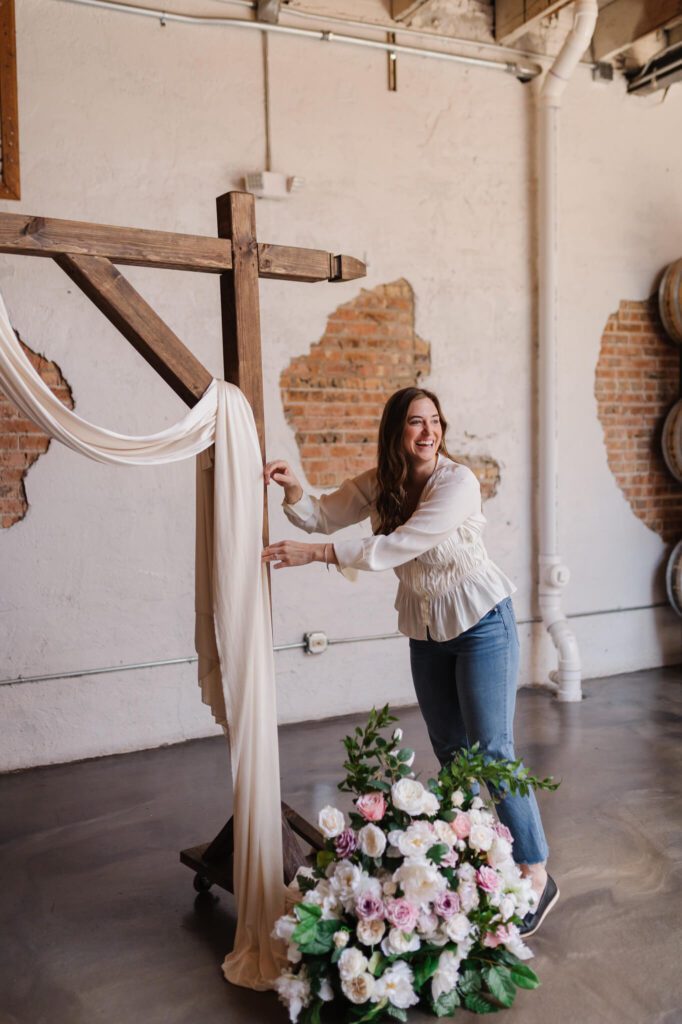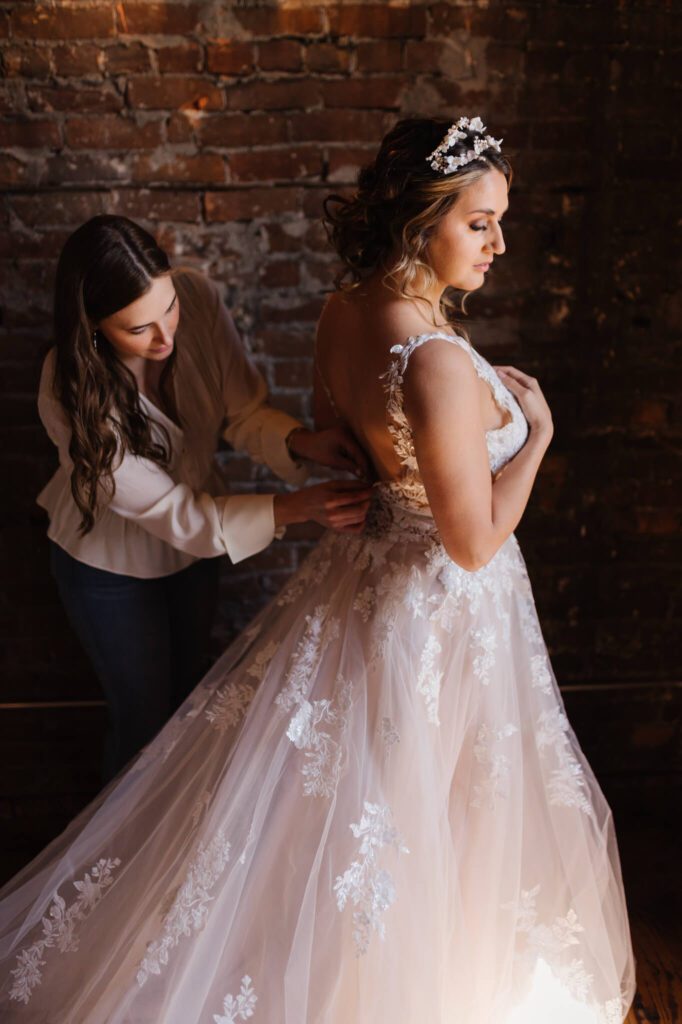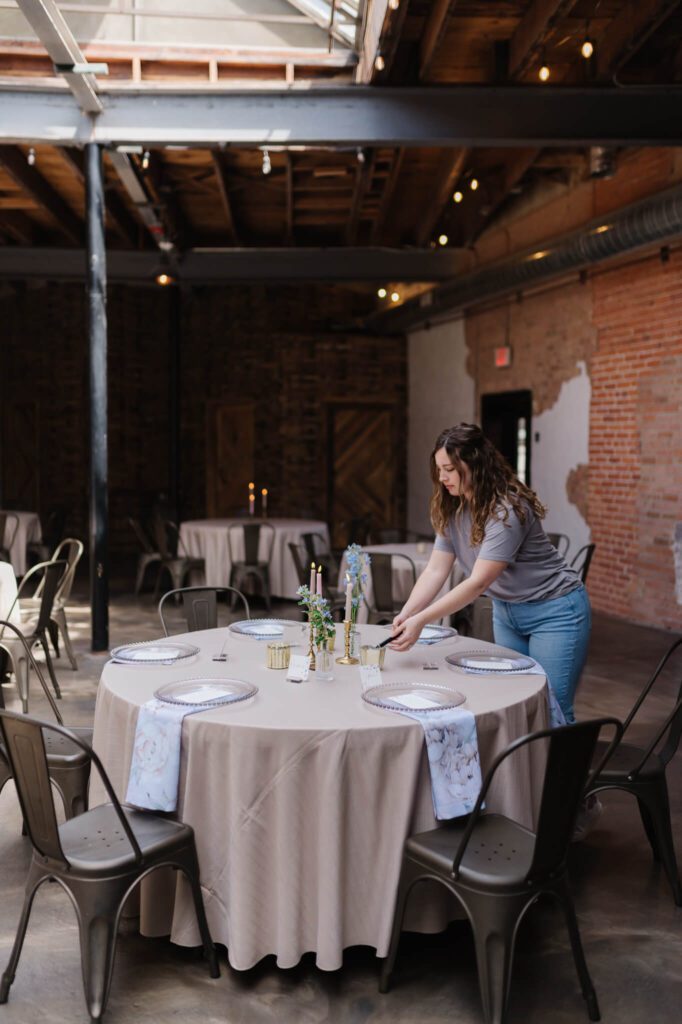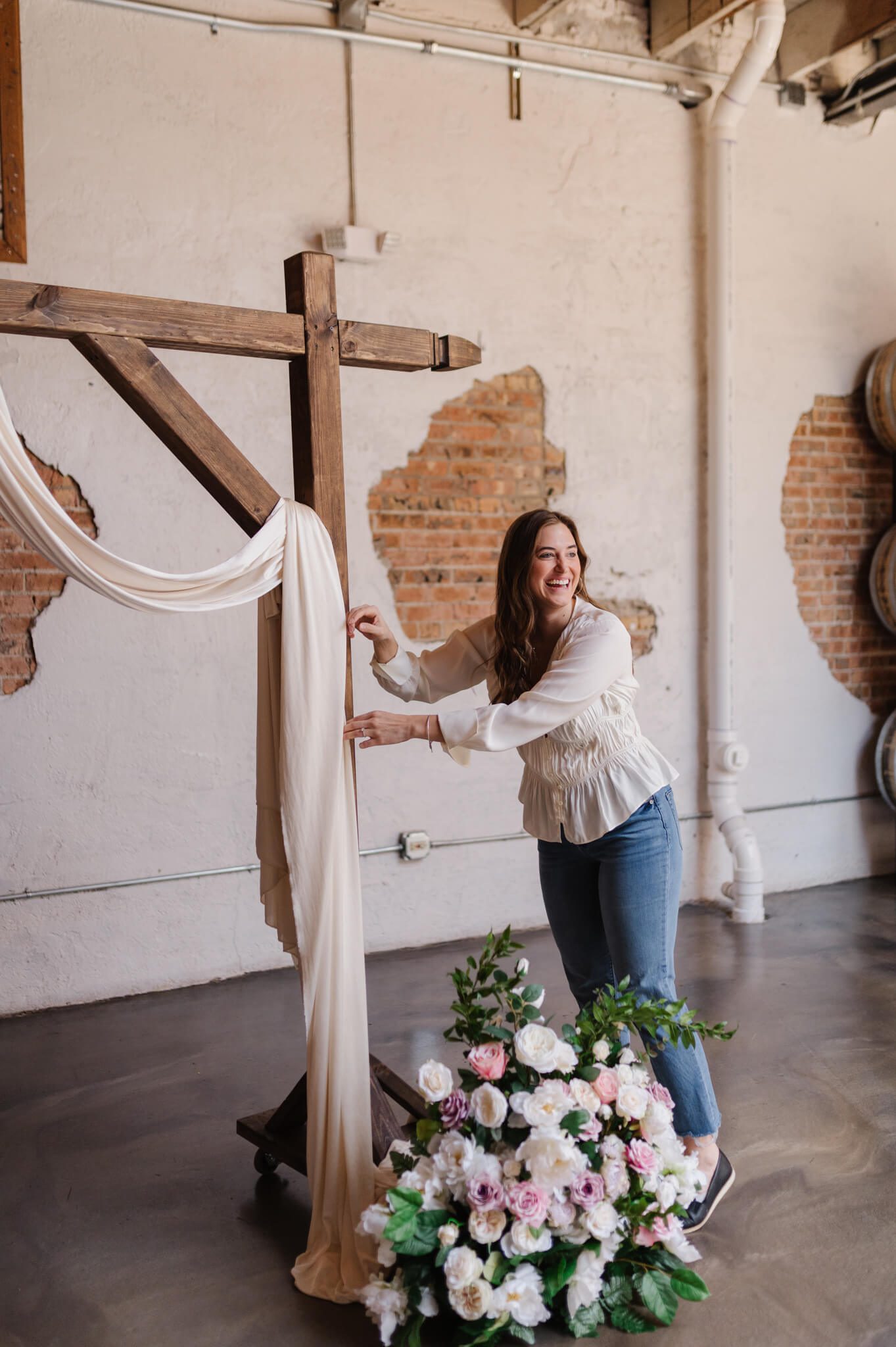Your wedding planner is one of the most important vendors you’ll hire. They’re in charge of the planning process, ensuring you stay on track, and everything that happens the day of.
Venue Coordinator vs. Wedding Planner: What’s the Difference?
If you’ve done a little research, you’ll notice lots of terms thrown around, like:
- Venue coordinator
- Day of planner
- Wedding designer
And of course – wedding planner. But aren’t all of these roles wedding planning roles?
Yes and no.
So who do you hire?
In this blog, we’ll go over the major players of wedding planning, and help you decide which vendors are the right ones for you.

What Is a Wedding Planner?
Simply put, a wedding planner is a person or team that oversees the planning and execution of your wedding day. They handle everything from helping you choose vendors to ensuring everyone gets down the aisle on time.
But not all wedding planners do everything. Let’s break it down…
Types of Wedding Planners
Wedding Designer
A wedding designer focuses on all the design aspects of planning: the way your event will look, what details will be included, and so on. They handle all of the “abstract” pieces of the initial planning process and bring all the details together to create a cohesive vision that you can use to execute your wedding.
Some full-service wedding planners offer design as part of their services, but some do not. If they don’t, you’ll be responsible for creating your wedding vision, which your wedding planner will use to bring it all together.
Full-Service Planners
What does a full-service wedding planner do?
A full-service wedding planner helps with all aspects of planning, from venue and vendor searching to rentals and decor, as well as logistics like timeline creation.
Every full-service planner has a different approach to planning that will require a different amount of work on your end. Some planners will ask for basic information and then get to work, while others may want you to have input every step of the way.
Regardless, a full-service planner is responsible for the execution of your wedding weekend or wedding day, so you don’t have to worry about a thing.
Partial-Service Planners
A partial-service wedding planner helps with some aspects of planning but not everything. Most partial planners charge for a-la-carte services or by the hour. You can pick and choose what tasks you’d like to pass off with a partial planner.
Most, if not all, partial planners will oversee the execution of your wedding weekend or wedding day, so you can focus on being present.
Event Management/Day-Of Coordination
Event management, also called day-of coordination, is a partial planning service that focuses on the execution of your wedding day.
Your event management team will help you:
- Fix your bustle
- Ensure you have food and water throughout the day
- Keep you on schedule
- Fix issues that may come up without you knowing
- Oversee outside vendors set up & clean up
With event management, you are responsible for all of the planning tasks a full-service planner would take on.
Your event management planner will meet with you about 1-3 months before your wedding date. They will take all the planning and logistics you’ve overseen and ensure everything is ready for a smooth event.
Who does a wedding planner work for?
Your wedding planner works for you and your fiancé. They are typically not associated with your venue or any other vendors.

What Is a Venue Coordinator?
A Venue Coordinator is an employee of your venue who serves as a liaison between you and the venue. Not all venues have coordinators, so make sure you ask.
Typical venue coordinator responsibilities include:
- Making sure doors are unlocked, and lights are turned on
- Overseeing venue staff
- Setting up venue-provided furniture and equipment
- Flipping the venue space from ceremony to reception (usually furniture only)
- Directing guests where to go
- Working with your wedding planner to go over logistics for your event
It’s important to remember that venue coordinators are NOT wedding planners. They will put their venue first, where your planner will put you and your vendors first. We often see high turnover in venue coordinators when they work for large companies because they are overworked (some work 3 weddings per weekend).
This doesn’t mean they’re not valuable to your vendor team! They just play a different role than your wedding planner. Often, they can’t give you the level of attention that a planner dedicated to your event can.
What a wedding venue coordinator does not do:
- Help you choose vendors (they might provide a preferred vendor list, but when is the last time they even updated that?)
- Any planning tasks (the venue requires you to provide all information without someone to ask/bounce ideas off of)
- Help you set up/clean up on wedding day (to your specifications. They might say they can do some of it, but they really don’t have the time)
Venue Coordinator vs. Event Management
It’s easy to confuse venue coordinators with event management services if you don’t know the difference.
Event management is very relationship-based. Usually, the event management team has worked with you for months leading up to your event. You may only meet your venue coordinator once before your wedding.
For your event to run smoothly, we recommend having a wedding planner and a venue coordinator. You can choose the type of planner based on your budget and how much of the planning you’d like to handle yourself.

What about in-house venue wedding planners?
Some venues will advertise that they have wedding planners on staff. Some are actual planners, while some are venue coordinators with different names. To determine who you work with, ask how many weddings they oversee. Someone who works 3 weddings every weekend can’t give you the attention you need and will likely be radio silent until the week of (or even the day before) your wedding. Wedding day is hard work!
Be thorough in your consultation with the venue, so you know what to expect. A misleading comment we see often is that venue coordinators know their venue better than anyone else. This is true, but again, they put the venue first!
For example, we’ve seen plenty of venues over-fill tables because it is easier on their staff. Wedding planners will look at it from your guests’ perspective – no one wants to touch elbows with the person next to them! We suggest no more than 8 people for a 60’ round table.
Without a wedding planner, you may go along with whatever the venue suggests because they’re the experts, right?! You don’t know what you don’t know. A wedding planner can advocate (and sometimes push if necessary) to ensure your event is perfect.
Frequently Asked Questions
Do I really need a Wedding Planner if I have a Venue Coordinator?
We’ll be honest, no. You don’t NEED a wedding planner if you feel confident your venue coordinator will execute your vision.
You might have friends or family who are willing to help on the day of your wedding. Just remember that if they are setting things up, they won’t be with you getting ready and enjoying the moments before you walk down the aisle. And do you really want them cleaning up at the night’s end (potentially a few drinks in)?
Who Benefits From a Wedding Planner?
People who value a professional who has their vision and best interests in mind.
We don’t want you to spend your wedding day worrying about whether the place cards are set at the correct tables, or the Marquee sign vendor showed up and set up the correct name in front of the DJ stand.
We could go on for hours about how wedding planners solve problems behind the scenes. At one wedding, we had a photo booth set up the wrong backdrop. It was space themed…definitely not the wedding vibe. We had the vendor change the backdrop, and the couple didn’t even know.
At another wedding, the florist came to drop off the personal flowers but forgot one of the bridesmaid’s bouquets. Because we check in with all vendors and deliveries, we caught this at 11 am, and the florist could go and make one more. The couple never knew anything was up!
Who Doesn’t Need a Wedding Planner?
The first qualification we recommend looking at is budget. If your total budget is 20k, you’ll have trouble finding a quality planner. Generally, we recommend 5-7% of your total budget be dedicated to hiring your wedding planner. Depending on your area, planners may cost more.
It really comes down to how much work you’re willing to do!
How Much Do People Spend on Wedding Planners?
Rule #1: don’t trust Google blindly. If you search for the cost of a wedding planner in your area, you will get a HUGE variety of answers.
For example, in the Chicago suburbs, Google says a wedding planner costs an average of $1,800.
We’re here to burst that bubble – you won’t find a professional planner with good experience at that price point. In our area, you’re more likely to be quoted the following:
- Day of Coordinator – $2,800 – $5,500+
- Partial Planning – $4,500 – $10,000+
- Full-Service Planning – $8,000 – $50,000+
This doesn’t mean you can’t find a great planner at a lower cost, but having realistic expectations for price is essential when budgeting and searching for vendors. Most planners list their prices or minimums on their websites or info packets. Take these numbers seriously and respect the planner’s time: if they’re too expensive, look elsewhere!
When should you hire your wedding planner, and what is the best way to find one?
MCE recommends:
- Event Management: 8-10 months before the wedding
- Partial Planning: 11-13 months before the wedding
- Full-Service Planning: 14-16 months before the wedding
If you don’t have a planner in mind, look at your venue’s IG and see if any planners that have worked weddings there fit your style. You can also ask the venue or other vendors if they have recommendations. When someone recommends a planner, you know they did a good job!
Be careful when searching on the Knot or other search platforms. Vendors pay to show up on these platforms, and they can pay more to be “featured” at the top of the search results for their area. There’s no skill associated with their placement, so read reviews and contact the planners you’re considering.
Ask your friends and family for recommendations. Even if you get a recommendation that you think is over your price point, that planner may know someone else in your price point. Once again, recommendations are huge!
Which planning service is right for you?
Our Planning Personality Quiz will help you determine your planning style (and what service might fit you best).
And, of course, if you’re interested in working with us for your event, check out our services page and get in touch. We’d love to chat with you!
